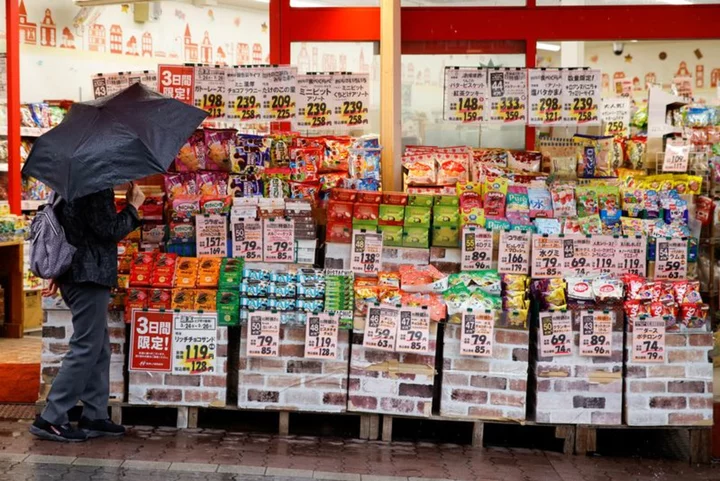By Takahiko Wada and Leika Kihara
TOKYO (Reuters) -Core inflation in Japan's capital perked up in June and remained above the central bank's 2% target for the 13th month, a sign price hikes were spreading to broader sectors of the economy and keeping policymakers pressured to dial back ultra-easy policy.
The data for Tokyo, which is seen as a leading indicator of nationwide trends, will likely feed into expectations for the Bank of Japan (BOJ) to phase out its massive stimulus this year.
However, there is uncertainty about how long households can weather price hikes and generate inflation driven more by demand, which holds the key to whether BOJ's 2% target can be achieved in a sustainable manner, analysts say.
"Inflationary pressure remains fairly strong as there are few signs companies are done hiking prices," said Yoshiki Shinke, chief economist at Dai-ichi Life Research Institute.
"The question is whether wages would rise enough to underpin consumption, and generate a positive wage-inflation cycle the BOJ hopes to achieve. The threshold seems quite high."
The Tokyo core consumer price index (CPI), which excludes volatile fresh food but includes fuel costs, rose 3.2% in June from a year earlier, accelerating from a 3.1% gain in May. It slightly missed a median market forecast for a 3.3% gain.
An index that strips away both fresh food and fuel costs rose 3.8% in June from a year earlier after a 3.9% gain in May, the data showed.
SUSHI, TOILET ROLL PRICES JUMP
Aside from an increase in utility bills that kicked off in June, Tokyo consumers paid 9.6% more than year-before levels for a box of sushi and 17% for hamburgers, the June data showed.
A roll of toilet paper was 15.5% more expensive and a tax ride was 14.4% higher in June than the previous year's levels.
While companies offered wage hikes unseen in three decades this year, inflation-adjusted real pay continues to fall in a sign of pain consumers are feeling from the wave of price hikes.
A survey by Teikoku Databank on 195 food goods producers showed they plan to raise prices for a combined 3,385 items in October, a report released by the think tank showed on Friday.
Uncertainty over the global outlook also keeps Japanese policymakers cautious of ending ultra-low rates too hastily.
Japan's factory output fell more than expected in May, data showed on Friday, underscoring risks to the export reliant economy as aggressive U.S. interest rate hikes and soft Chinese growth cloud the outlook for global demand.
Markets are focusing on the BOJ's new quarterly growth and inflation projections due at its next rate review on July 27-28, for clues on how soon the central bank could phase out stimulus.
Many analysts expect the BOJ to revise up its core consumer inflation for the current fiscal year ending in March 2024 from 1.8% projected in April. Dai-ichi Life's Shinke sees inflation averaging anywhere between 2.5% and 3% this fiscal year.
BOJ Governor Kazuo Ueda has repeatedly said the BOJ will maintain ultra-loose policy until stronger wage growth keeps inflation sustainably around its 2% target.
In an interview with Reuters conducted on Wednesday, BOJ Deputy Governor Ryozo Himino also said strong domestic demand and changes in corporate price-setting behaviour were emerging as new factors pushing up inflation. But he stressed the need to keep ultra-low interest rates for now.
"The BOJ may revise up its inflation forecast but probably keep policy steady in July," said Takeshi Minami, chief economist at Norinchukin Research Institute.
"I don't think policymakers have changed their view it's still difficult for inflation to sustainably hit 2%."
(Reporting by Takahiko Wada and Leika Kihara; Additional reporting by Satoshi Sugiyama and Kantaro Komiya; Editing by Sam Holmes and Shri Navaratnam)

